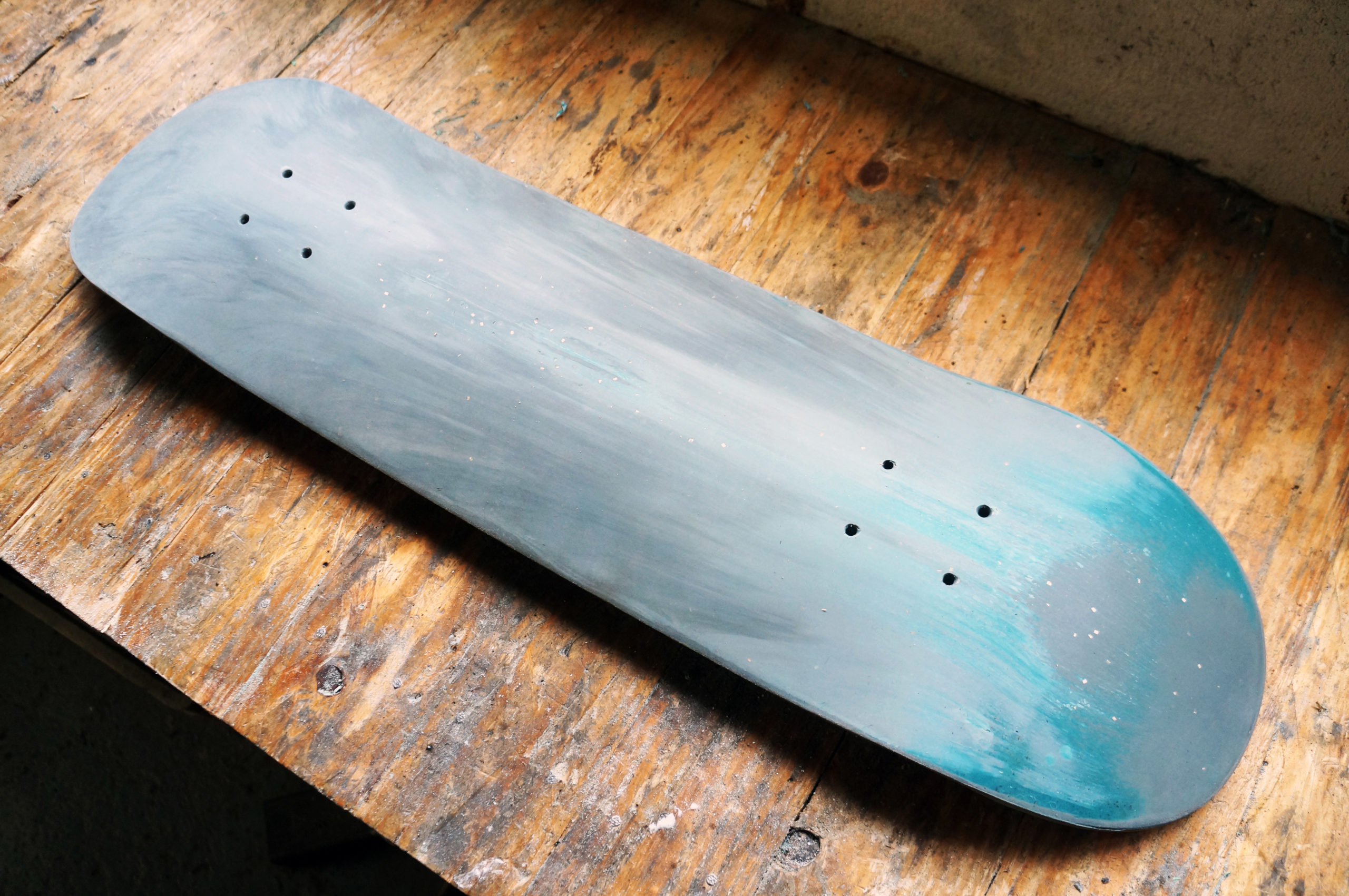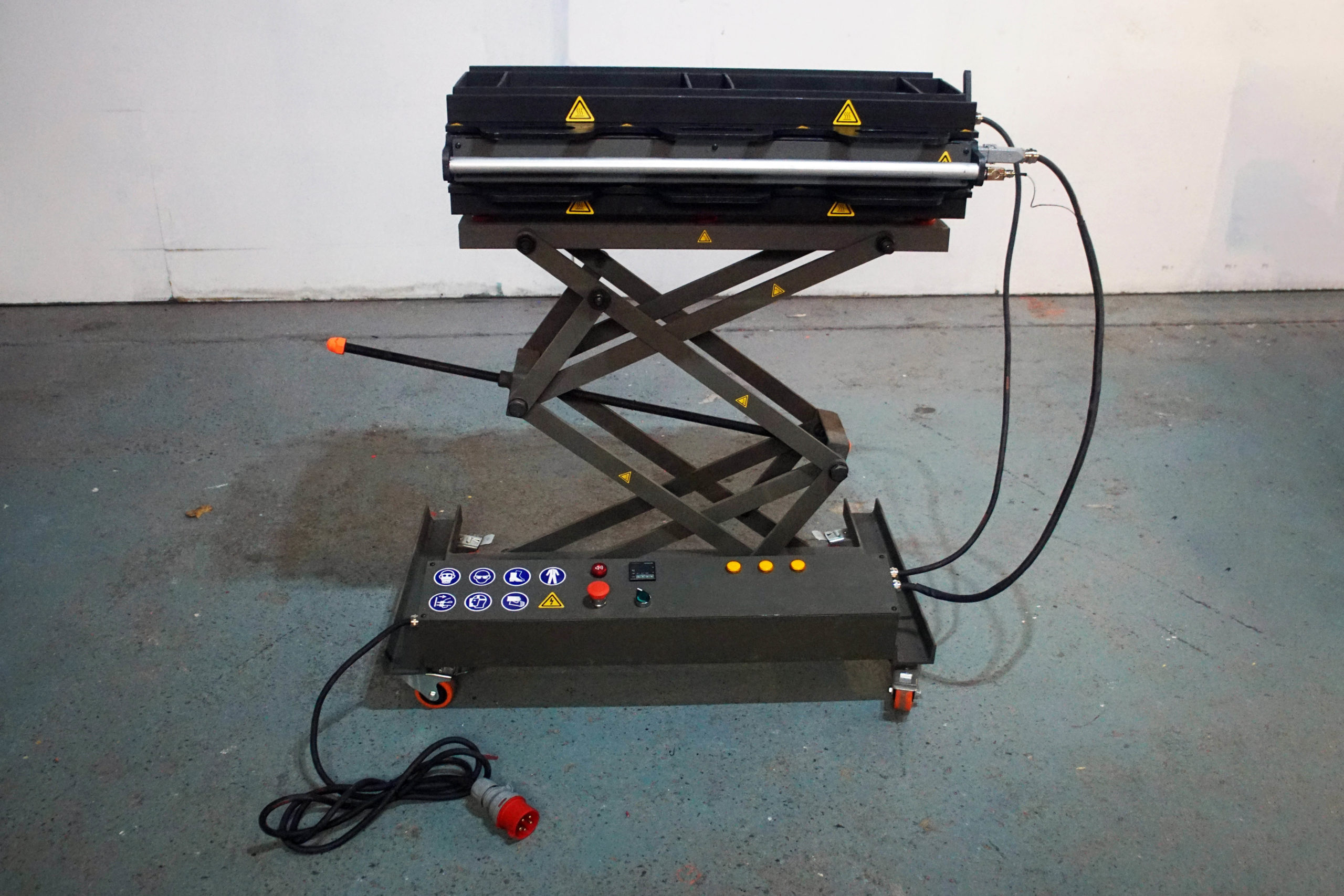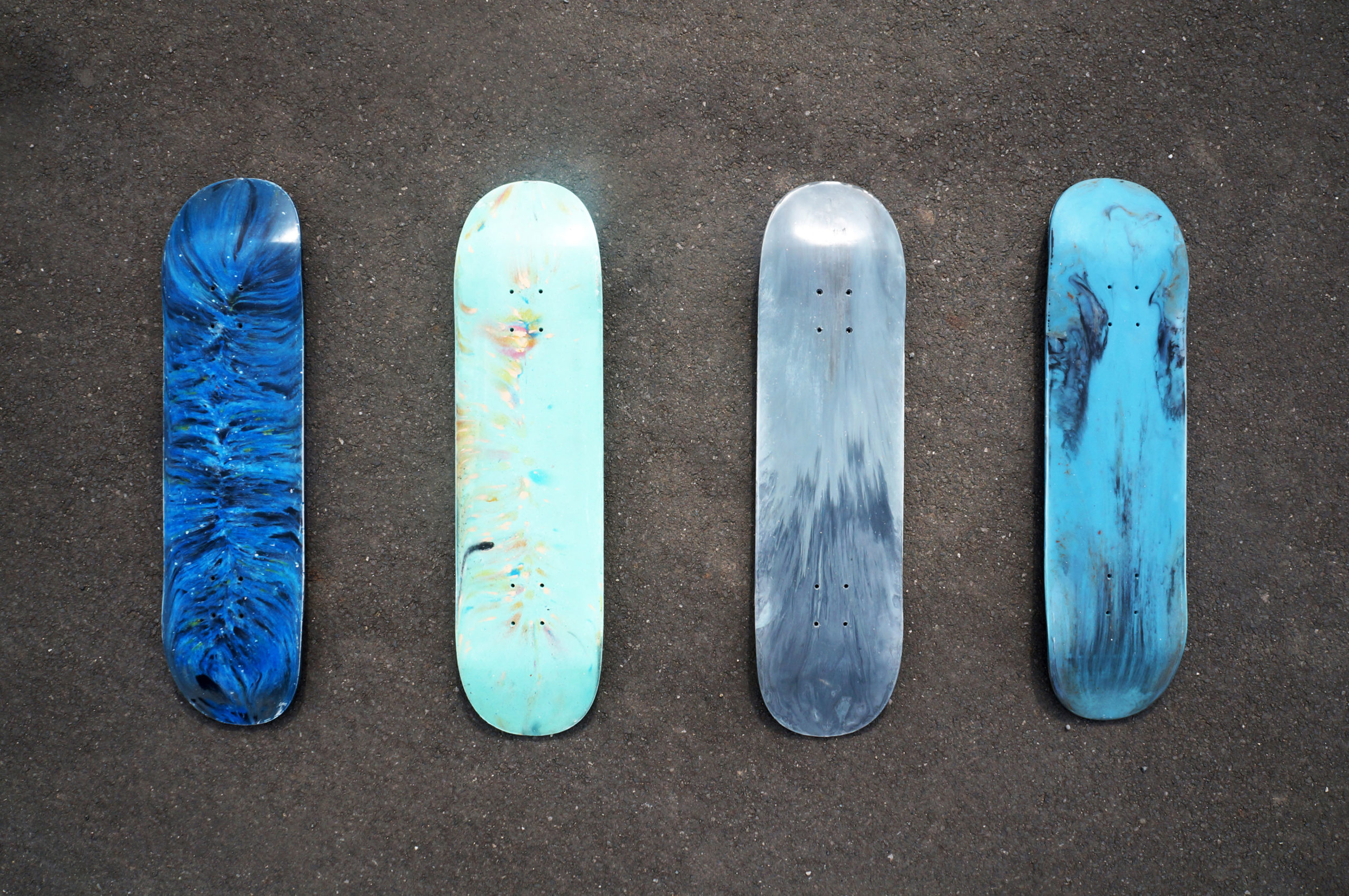RPSD: Recycled Plastic Skateboard Deck

Useful information
- Team members
- Jason Knight
- Country
- Finland
- Keywords
- rpsd projectrpsd mandin collective recycled plastic skateboard deck mould skating skate design designer art opensource upcycle recycling object design machin edesign cnc sustainability sustainable environment ecology zero waste making maker movement maker circular conscious consumption
Short Description
Tackling plastic waste, democratizing skateboarding & proving what recycled plastic can really do.
Detailed Description
We have developed a manufacturing system to produce skateboard decks from recycled plastic.
The most innovative, unique part is the mould, as this has previously not existed. We proudly say these are the first, and only, popsicle skateboard decks in the world to be made from recycled plastic.
We publish open-source research containing all the information people need to produce skateboard decks. The goal is not to monopolise but facilitate, enable and empower others.
Documentation of the peripheral machines exists and is familiar to 1000s of people globally. In addition to newcomers, there is an expansive network to integrate with.
Decks are a holistically considered choice. The most significant reasons:
-Demonstrate strength of the material beyond aesthetics.
-Rewarding, provides a fun, tangible and healthy incentive for recycling.
-Ease of manufacture, both the product and the process are simple.
Our main focus of impact is:
-Environmental
-Social
-Economic
-Emotive
Project Details
- Does your design take social and cultural challenges and human wellbeing into consideration?
Our project addresses multiple cultural and social problems, the most significant are:
• Accessibility of skateboarding. Skateboarding, as a hobby, remains out of reach to many due to their economic situation and hence lack of other financial or material resources to participate in skate culture. Making decks from waste dramatically reduces cost & hence increases accessibility, democratising access.
• Participation in sport. More people are able to participate in sports, as a direct result of eased accessibility, which brings the inherent health and social benefits of being part of a sporting community.
• Perspective on usefulness of waste. The project aims to change people's perspective about plastic waste from seeing it as something that can only be discarded or used to create sub-standard products, both aesthetically and mechanically speaking, to seeing it as material you can use to make something beautiful, strong and useful.
• lack Incentive to recycle. Provide people with a fun, tangible reward for plastic recycling, hence incentivizing them to recycle.
• Lack of transparency and trust in traditional waste management. Modern recycling systems are a relatively opaque and abstracted process. Your recyclables are collected by the waste collection system, they disappear, and are processed without you knowing the details of what happens or directly receiving the reward for making the environmentally ethical and responsible effort of ensuring they are recycled. Alternatively, by using plastic waste to create skateboard decks, people receive a direct, tangible reward that is fun, hence making it desirable, with the added benefit of being something that is good for their health to use.
• Lack of economic activity in the suitability sector. Our projects main goal is to create and stimulate small-mid sized localized circular plastic recycling economies. Currently waste is one of the newest resources humans are realizing they can tap into for economic gain, but this practice is relatively young and the information and know-how needed to do it successfully are not significantly abundant to match the magnitude of the problem. We want to spread this know-how and catalyse its implementation however necessary.
• Lack of employment opportunities. As well as an economic problem, this can also be viewed as a social motive. Unemployment is a global problem, with waste recovery not being fully utilized, a pairing of the two problems creates a symbiotic relationship.
- Does your design support sustainable production, embodying circular or regenerative design practices?
On the most fundamental level, hand-to-mouth so to speak, the project literally gives people a tool, and the knowledge surrounding it, that allows them to transform recycled plastic in to useable products, This directly enables them to bring recycled plastic products in to market, and hence catalyses the shift to a circular economy.
This is achieved by pioneering plastic recycling research, which we publish online, open source, for free. Then providing support in the form of consultancy, hands-on help, and funding, to help people set up their own recycled plastic skateboard deck workspaces.
Our most significant technological development is designing and building our own manufacturing system that allows skateboards to be produced at a low cost and with a small amount of infrastructure, e.g. in a domestic or small commercial context using basic tooling. The manufacturing system uses a combination of a custom-designed and built mould supported by pre-existing open source machines, e.g. an extrusion machine and plastic shredder.
The most innovative and unique element of this system is the development of the mould used to make the decks, as this has previously not been achieved, so we can say, proudly, that these are the first, and only, traditional popsicle skateboard decks in the world to be made from recycled plastic. There is no existing documentation published about how to use this equipment to produce a traditional popsicle skateboard deck. Hence, this has been the concentration of our efforts since the beginning of the project.Our design directly tackles plastic pollution by increasing the amount of plastic recuperated from waste streams, and hence preventing it from turning into pollution. Every year we produce over 350 million tons of new plastic. Since its invention, over 9 billion tons of new plastic have been produced. More than 90% is recyclable but less than 10% actually gets recycled. This means that there are over 6 billion tons of plastic waste in the world right now, ready to be collected and recycled. This plastic ends up in the food, water, and air that all living things on our planet consume.
Traditionally skateboard decks are made from Canadian Maple Plywood and are the single biggest contributor to their deforestation. Making decks from recycled plastic alleviates the rate of deforestation by providing a locally source able, non-virgin alternative.
This also creates an inherent reduction of CO2 emissions, by leaving the trees untouched, and reduction of strain on transportation systems by localizing production the of skateboard decks. Over 90% are made in North America and China and distributed globally. Our design allows people to be able to make them anywhere in the space the size of a garage.
- Does your design use principles of distribution and open source?
All of our work is published online, open source, for free. It always has been and it always will be, so that anyone, anywhere in the world can pick it up, develop it, rework it and implement it, on the condition that they share their results back. The goal of the project is not to monopolise production but act more as a facilitator to enable and empower others.
Our research is published in the format of Download Kits, containing all the information people need to set up their own skateboard deck production, with supporting detailed instructional videos.
The download kit will include:
• Engineering drawings
• Electronics schematics
• Assembly guide
• Build video
• Usage video
• Technical data sheets
• Bill of materials
• Links to supporting machine download kits
• Digital business + community building toolsThe download kit is used in combination with out one hour long build video that guides step by step how to build and use our mould to produce skateboard decks from recycled plastic.
The download kit can be found here: tinyurl.com/ProjectRPSD
Our process of manufacture and usability themselves have been to be replicable using low cost, easily and globally accessible tools, (Hand drill, grinder, stick welder and hand tools) to ensure that anyone, anywhere in the world can replicate the design without the need for much infrastructure or start-up capital.
Skateboards were septically chosen due to their relative ease to produce. Plastic, being a very versatile material, can be used to make objects big and small, in a variety of shapes, with intricate and microscopic detail, but with this variety of shape and detail comes complexity of manufacturing process and high tolerance requirements. The more physical detail and complexity the product has, the harder it is to make and the more likely it is to fail in the manufacturing process. Skateboard decks are a relatively simple shape; having no small details or complex shapes. We want the product we implement to be easy and hassle-free for people to make so they are not intimidated by the process.
Our system integrates two pre-existing opens source machines, a shredder and a plastic extruder. Documentation on how to build and use them already exists and has been popularised by the machine development community, Precious Plastic. The machines are being replicated & used by 1000s of people all over the world so there is already an expansive network of recyclers & machinists familiar with the process involved, ready to integrate the mould into their manufacturing system. In addition to this pre-existing manufacturing network, our goal is to help more people join and get set up to start recycling.
- Does your design promote awareness of responsible design and consumption?
One of the largest underlying motives of the project is to create a perspective change in how people view plastic waste through wide spread exposure. The thing that often stands out about products made from recycled plastic is the beauty of their appearance but what’s often overlooked is their strength & durability. Skateboard decks were chosen because they demonstrate this. When people see someone riding a deck, a thin slither of recycled plastic, that takes hard knocks and scrapes, they are conveyed the idea that the material is strong & durable. This plants the seed of taking the material more seriously, challenges the idea that just because the material is not in its first time through the consumer cycle that its quality and potential is compromised, and inspires people to consider using it for purposes that they previously would not have.
Exposure can either be first person, or via the media. The mediums for communicating this are in the format of pictures, video (e.g. traditional skate videos showing our decks being used) and real world demonstrations. All of this will used to create online contact shared for free on our own web channels and social media platforms. To improve the reach, we collaborate with media platforms, a full list of our past media publications can be found on the home page of our website.Beyond promotional media, our main output is to create educational and instructional material that informs people about plastic recycling. The material has been curated to be comprehendible, digestible and comprehensive with the goal of making it as easy as possible for people to start making desirable products from recycling plastic, and spread this information as wise as we can across the globe. Publishing this content is infact the main priority and objective of our project, and its most significant output.
Images


